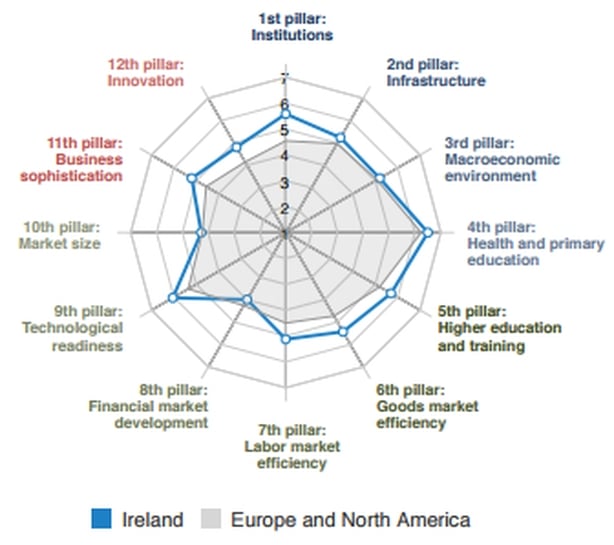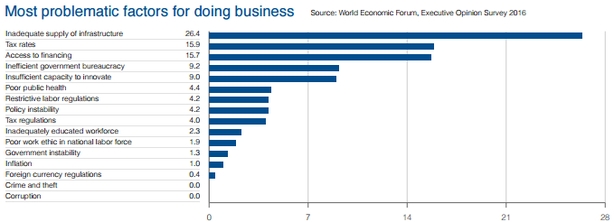The latest world competitiveness index was published this week, compiled by the World Economic Forum.
OK, so it’s a survey of senior executives – but it is a snapshot of what others think of us, and an effort to rank economies by a dozen basic “pillars” of competitiveness – such as institutions, infrastructure, health and primary education etc. So we can make comparisons (up to a point).
Ireland’s overall rank is 23 out of 138 countries surveyed. Not a bad score, and we are sandwiched in between Australia (22) and Israel (24) – good company, one would think.
The ranking score of 5.2 out of seven is the same as those two neighbours – indeed places 18 to 25 on the rankings get the same score, covering Qatar, Austria, Luxembourg, France and Malaysia.
Again, good company to be in.
But Finland – a country with a similar population size and similar issues of geographic peripherality and dominant neighbours – comes in at tenth place overall (scoring 5.4). Suggesting there is ample scope for improvement through decisions that are ours to make.
The good folk at the World Economic Forum (they of Davos fame) have grouped the 12 pillars into three sub-indices – basic requirements (where we get an overall ranking of 21st place), efficiency enhancers (where we are ranked 20th), and innovation and sophistication factors (where we are ranked at 19th).
But the pillars are broken down into 109 detailed indicators for ranking purposes. Ireland scores number one in the world on two of these – business Impact of rules on FDI, and FDI and technology transfer.
Ireland’s best “pillar score” is sixth out of 138 countries surveyed, and it is for goods market efficiency – led by that business impact of FDI rules ranking.
The only surprise perhaps is that it is ranked number two for prevalence of foreign ownership. It’s number four for non-tariff barriers, and fifth for tariffs.
And despite the Apple ballyhoo, Ireland is only ranked at number 17 in the category “effect of taxation on incentives to invest”.
Buyer sophistication is pretty decent too, with a ranking of 20, but we score badly on “intensity of local competition” - 64th place!
Ireland’s next best ranking categories in the 12 pillars are “Labour Market Efficiency” and Technological Readiness”, which both rank at 12 of 138. As does institutions.
In the Labour Market pillar, Ireland scores well on its ability to attract talent – at seventh place. But it does rather less well on capacity to retain talent, at 18th.
Pay and productivity and reliance on professional management also see Ireland ranked in seventh place.
Where the country does badly is in the effects of taxation on incentives to work, where it is ranked 85th.
The technological readiness score is pulled up by that number 1 ranking for FDI and technology transfer. Otherwise the rankings here lie on either side of the overall ranking of 23rd place.
So firm level adoption of technology ranks 23, for availability of latest technology we rank 24th.
The institutions of the State and society come out pretty well, with an overall ranking of 12th of 138 countries.
Corruption is not seen as a particular problem in Ireland by the type of people who are surveyed by the World Economic Forum. We are ranked at number ten (out of 138) when it comes to favouritism in decisions of government officials, number nine on bribes and irregular payments, number nine on diversion of public funds, number 14 for public trust in politicians and number six for judicial independence.
Even business itself does pretty well, with the ethical behaviour of firms being raked at 16th best.
Government may be seen as honest, but it scores a less impressive 32nd for wastefulness of government spending.

And while the judiciary is impartial, and property and intellectual property rights are strong (nine and nine ranked respectively) the efficiency of the legal framework in settling disputes only manages to rank at 30th place.
It is a good job the burden of government regulation is seen as pretty light – coming in at ninth place.
The business cost of crime and violence comes in at 42nd place – not good, and the trend is getting worse. Reliability of police service was ranked at 19th of 138.
The worst score in this pillar was for the “strength of auditing and reporting standards” – where we ranked 54th out of 138. This is not good.
Much better is the performance in the pillars “business sophistication”, ranking 16th, and innovation, ranking 19th.
In the former we score well for production process sophistication (10th), 11th for value chain breadth and 17th for state of cluster development and nature of competitive advantage.
Local supplier quality is a decent 20th, but local supplier quantity is a less satisfying 50th.
As for innovation – we score well for availability of scientists and engineers (12th), university-industry R&D collaboration (13th), quality of scientific institutions (15th) capacity for innovation (16th).
Company spending on R&D is ranked 20th, as is patent applications. Pulling down the overall ranking in this pillar is “government procurement of advanced tech products”, where we rank at 47th place.
But it’s the banks that do the most to drag the competitive performance down. For the pillar financial market development, we come in at a lowly 67th overall, with affordability of financial servicer a poor 81st, and soundness of banks a wretched 111 – out of 138 countries!
Respondents to the WEF survey were given 16 “problematic factors in doing business” and were asked to select five and rank them in terms of importance.
For Ireland the winner, by a country mile, was “inadequate supply of infrastructure”, with a score of 26.4. Tax rates were next, with a score of 15.9, followed closely by access to financing at 15.7.
Inefficient government bureaucracy was fourth most problematic, scoring 9.2 just ahead of “insufficient capacity to innovate”.
Next came “poor public health” – a long way down scoring 4.4, just ahead of restrictive labour regulations and policy instability.
Government instability was not seen as a problem, scoring just 1.3, slightly more than inflation, 1.0, and behind “poor work ethic in national labour force (1.9).
The categories “crime and theft” and “corruption” both scored zero in the list of most problematic factors in doing business in Ireland.

Does any of this matter outside the bubble of those chasing and placing FDI? Of course the WEF will say it does, and their justification in this year’s report revolves around quantitative easing and other unconventional monetary measures by central banks.
The WEF says the Central Bank actions have been insufficient to re-ignite economic growth in the advanced economies because not enough of them are competitive enough.
It finds that “interventions by economies with comparatively low GCI scores failed to generate the same effect as those performed by economies with high scores, suggesting that strong underlying competitiveness is a key requirement for successful monetary stimulus”.
The WEF also echoes the IMF in worrying about declining trade openness.
WEF founder Klaus Schwab said “declining openness in the global economy is harming competitiveness and making it harder for leaders to drive sustainable, inclusive growth”.
This trend is based on “perception data” in the survey of executive opinion carried out by WEF.
It’s seen as gradual and attributed mainly to a rise in non-tariff barriers, burdensome customs procedures, rules affecting FDI and foreign ownership.
The good news for Ireland is that we score very well in all of these areas. But it’s a problem if many of our trade partners are getting worse in these areas.
And Brexit could be a step-change in the wrong direction for many of these factors.
Comment via Twitter: @seanwhelanRTE






